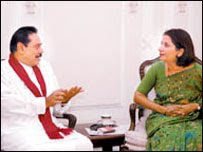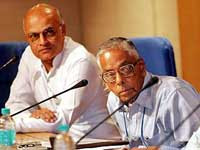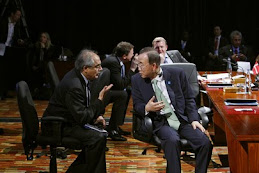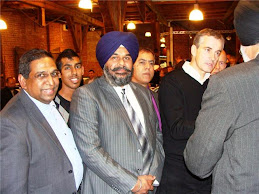Tuesday, April 19, 2011
Ban's most senior adviser: chief of staff Vijay Nambiar, whose role in the so called white flag murders at the end of the conflict has been described!
On Sri Lanka, UN Withholds Report Which Was Leaked "Shortly After" Gov't Got it For Review by Adviser Nambiar
2011-04-19
Ban depicted in camp with gun, full report still not shown
Three full days after portions of the Sri Lanka war crimes report was leaked, presumptively by the government of Mahinda Rajapaksa, to The Island newspaper, the UN still at its Monday noon briefing did not release the full report.
Inner City Press asked acting Deputy Spokesman Farhan Haq why the report was not being released, whether the Panel of Experts would take questions as took place for example on connection with the UN's report on the murder of Benazhir Bhutto of Pakistan, and for the UN's view of Rajaksa's call for a mass protest of the report on May 1.
Inner City Press also asked who the UN thought leaked the report.
Haq said that “it did leak to a Sri Lankan newspaper, and... shortly after we gave the report to the government of Sri Lanka.”
While the UN says it is hoping, and was waiting, for a formal response from the Sri Lanka government, Mahinda Rajapaksa has already called for mass protests against the report on May 1. On this, Haq said that the UN called on the government to abide by its responsibility for the safety of UN staff.
Haq did not answer about any press conference or Q&A with the Panel of Experts. His explanation of the non-release of the report was that “the Secretary General and the Senior Advisers are reviewing” the report.
One of Ban's most senior advisers is his chief of staff Vijay Nambiar, whose role in the so called white flag murders at the end of the conflict has been described, among other places, in a filing this year with the International Criminal Court about which Inner City Press has repeated asked the UN.
Inner City Press has asked if Nambiar would be recused from consideration of the Sri Lanka war crimes accountability report, and the reply was that the decision on the report would be by Ban himself. But now, as stated at Monday's noon briefing, the senior advisers -- which includes Nambiar - are also involved in the review.
Since even the portions leaked to The Island criticize Ban Ki-moon's Secretariat for not release casualty figures during the conflict, Inner City Press asked Haq to respond to that. He said no, there will be no response until after Ban and the Senior Advisers -- including Nambiar -- review the report. Watch this site.
Even as leaked, the report says that
“During the final stages of the war, the United Nations political organs and bodies failed to take actions that might have protected civilians. Moreover, although senior international officials advocated in public and in private with the Government that it protect civilians and stop the shelling of hospitals and United Nations or ICRC locations, in the Panel’s view, the public use of casualty figures would have strengthened the call for the protection of civilians while those events in the Vanni were unfolding....
“Considering the response of the United Nations to the plight of civilians in the Vanni during the final stages of the war in Sri Lanka and the aftermath.. The Secretary-General should conduct a comprehensive review of actions by the United Nations system during the war in Sri Lanka and the aftermath, regarding the implementation of its humanitarian and protection mandates.”
But how is this Secretary General, with a chief of staff whose role in the so called white flag killings in Sri Lanka, and who withheld his own Office for the Coordination of Humanitarian Affairs casualty figures which were subsequently leaked to and published by Inner City Press, to credibly “conduct of comprehensive review” of his own behavior, and that of his senior advisers?
Click here for an Inner City Press YouTube channel video, mostly UN Headquarters footage, about civilian deaths in Sri Lanka.
Click here for Inner City Press' March 27 UN debate
Click here for Inner City Press March 12 UN (and AIG bailout) debate
Click here for Inner City Press' Feb .26 UN debate
Click here for Feb. 12 debate on Sri Lanka http://bloggingheads.tv/diavlogs/17772?in=11:33&out=32:56
Click here for Inner City Press' Jan. 16, 2009 debate about Gaza
Click here for Inner City Press' review-of-2008 UN Top Ten debate
lick here for Inner City Press' December 24 debate on UN budget, Niger
Click here from Inner City Press' December 12 debate on UN double standards
Click here for Inner City Press' November 25 debate on Somalia, politics
and this October 17 debate, on Security Council and Obama and the UN.
- By Matthew Russell Lee [Inner City Press]
© IT Division - Lanka News Web.com - All rights reserved.
Best viewed in 1024x768 resolution
TNA urged MR regime not to miss the opportunity to "constructively engage in a process which would result in true democracy,equality & justice.!!!
TNA urges GoSL not to miss theopportunity to engage in equality process
[Tamil Net, Monday, 18 April 2011, 18:38 GMT]
R. Sampanthan, the parliamentary group leaderof the Tamil National Alliance (TNA), in his response to the leaked recommendations of the UN Panel, on Monday said that the TNA urged the Rajapaksa regime not to miss the opportunity to "constructively engage ina process which would result in all the Peoples of Sri Lanka being the beneficiaries of genuine democracy, equality and justice."
“The TNA on its part has always been committed and continues to becommitted towards achieving a genuine political solution that recognizes SriLanka's ethnic diversity and a full and inclusive citizenship of all itsPeoples, including Tamils as a foundation for permanent peace and stability inthe country,” Mr. Sampan than said in his response.
Full text of the statement by Mr. R. Sampanthanfollows:
We have read the disclosure made by the media, said to be the Executive Summaryof the Report submitted by the Advisory Panel to the United Nations SecretaryGeneral (UNSG).
The Tamil National Alliance (TNA), as the democratically electedrepresentatives of the Tamil People of the North East, who have been the worstaffected victims of the recently concluded war, we consider it our duty torespond to same, while reserving a fuller response to the full Report after itbecomes available to us.
We recall here with deep anguish, that for over the past half a century, wehave consistently urged an acceptable and reasonable political solution toaddress the root causes of the ethno-nationalist conflict in the country andthe exclusion of the Tamil People from meaningful powers of governance. It isthe failure on the part of successive governments of the Sri Lankan State todeliver on such a political solution that has been the primary cause for theexacerbation of the conflict and the consequences thereof. The Sri Lankan Statehas over the years, systematically and continuously unleashed violence againstunarmed Tamil civilians in order to suppress and subjugate them and to deny anddeprive them of the realization of any legitimate power-sharing.
We have consistently emphasized that the Sri Lankan government had a duty toensure that unarmed Tamil civilians are protected and not harmed in the courseof whatever military operations the Government conducts against armedcombatants. However, the Sri Lankan government has persistently bombed civilianpopulated areas, used heavy artillery and multi-barrel rocket launchers in suchareas, carried out attacks by deep penetration units resulting in the death ofand serious injury to tens of thousands of unarmed Tamil civilians, displacedhundreds of thousands of such Tamil civilians from their homes, destroyed theirhomes and all their occupational equipment and other assets, reducing them to astate of destitution, deprived such unarmed Tamil civilians of shelter, food,medicines, drinking water and other essentials, shelled hospitals and relief centresand prosecuted their military operations with scant regard for the safety,well-being and dignity of the unarmed Tamil civilians in conflict areas. Theextra-judicial execution and enforced disappearance of unarmed Tamil civiliansand the scourge of the white vans has continued unabated. These and otheraccounts of horrendous incidents were contemporaneously placed on record inParliament by the TNA and brought to the notice of all concerned.
We observe that the Report of the Advisory Panel to the UNSG confirms the truthof what happened to the unarmed Tamil civilians in the course of the conduct ofthe recently concluded war and is an irrefutable confirmation of the accountsof the events as reported by us to Parliament as and when they occurred. Wewelcome the finding by the panel that "credible allegations, which ifproven, indicate that a wide range of serious violations of internationalhumanitarian law and international human rights law were committed both by theGovernment of Sri Lanka and the LTTE, some of which would amount to war crimesand crimes against humanity. Indeed, the conduct of the war represented a graveassault on the entire regime of international law designed to protectindividual dignity during both war and peace."
Especially the Panel has also found credible allegations associated with thefinal stages of the war and that the Sri Lankan Army’s military campaigninto the Vanni using large scale and widespread shelling caused large numbersof civilian deaths. The Panel states that this campaign constituted persecutionof the population of the Vanni, of around 330,000 civilians. TheGovernment’s estimate of the population in the Vanni at this time wasonly 70,000. The Panel also asserts that these credibly alleged violationsdemand a serious investigation and the prosecution of those responsible. ThePanel also notes that "the Government’s notion of accountability isnot in accordance with international standards." The Panel also requiresthat the Government genuinely addresses the allegations of violations committedby both sides and to place the rights and dignity of the victims of theconflict at the centre of its approach to accountability, if its measures arenot to fall dramatically short of international expectations. In this context,the Panel has recommended certain measures, which as a whole, it hopes willserve as a framework for an ongoing and constructive engagement between theSecretary-General and the Government of Sri Lanka on accountability. We welcomethe recommendations made by the Panel and trust that they will be honestlyimplemented.
Most importantly, the Panel has observed that an environment conducive toaccountability which would permit a candid appraisal of the broad patterns ofthe past, including the root causes of the long-running ethno-nationalistconflict, does not exist at present. It would require concrete steps towardsbuilding an open society in which human rights are respected, as well as afundamental shift away from triumphalism and denial towards a genuinecommitment to a political solution that recognizes Sri Lanka's ethnic diversityand a full and inclusive citizenship of its entire people, including Tamils asa foundation for the country's future.
The TNA on its part has always been committed and continues to be committedtowards achieving a genuine political solution that recognizes Sri Lanka's ethnic diversityand a full and inclusive citizenship of all its Peoples, including Tamils as a foundation for permanent peace and stability in the country. We therefore urgethe Government of Sri Lanka not to miss this opportunity and to constructivelyengage in a process which would result in all the Peoples of Sri Lanka beingthe beneficiaries of genuine democracy, equality and justice.
R Sampanthan,
Parliamentary Group Leader
Tamil National Alliance
Thursday, April 14, 2011
Wednesday, April 13, 2011
Monday, April 11, 2011
Those who supported the Tigers are in sorrow & shock; those who opposed them (wishing and wanting a democratic way of life) feel cheated & BITTER.!!!
“Hatred“?......................PROF.CS
How many civilians died in the last phase of the war? Was it 20,000 or 30,000 or 40,000? You’ll know better. Numbers, statistics, but the difference between zero and one is eternity and the whole world - when that one digit represents a much-loved individual. The past cannot be recalled, and that particular human being will not ever live again. Since thousands died, it follows that thousands of Tamils live with loss and grief that are life-long. Perhaps all Tamils know, at the least, someone who knows someone who has lost a dear relation or friend; someone gravely injured, deeply traumatised or driven into exile. There was no need to proceed with the onslaught because the Tigers were ringed with steel so tight that hardly the air could have escaped. The heedless haste to press on, callous to the civilian cost, was based not on military strategy but political calculation with an eye to gaining election-winning popularity. It is yet another example of shutting the gates of mercy on humankind, and wading through slaughter to power,
It was an appalling price but some Tamils (including those within the Island but outside the conflict zone) thought that that massacre and the end of the Tigers would mark the beginning of a new Sri Lanka, one of freedom, equality and dignity for all: a “baptism”, bloody but necessary for a new birth. They now feel disabused, deceived and disillusioned. People who visit the North describe the state of the region and the reality of daily life for its people. (You are aware, for you travel regularly in connection with the humanitarian work you do.) After all, one of the reasons proclaimed for waging the war was to free Tamils from Tiger tyranny. But tyranny, whether exercised by an armed group or the state, makes no difference to the hapless victims of untrammelled power. Power, like alcohol, goes to the head. And the longer one is drunk (has power), the more habituated - and worse - one becomes. Tamils, irrespective of age, sex or status in the community, can be, and are, rudely handled, humiliated, assaulted, even eliminated – all with complete immunity. And it’s not only the Sinhalese (be they in uniform or not) but Tamils also: a friend told me of being mistreated recently by a uniformed “boy” (in age to him) who later turned out to be a member of a Tamil group working in collaboration with, and under the protection of, the government. (Is it a case of the dogs of the king enjoying a higher status than ordinary humans?)
Your write that “the hatred” on both sides is very “deep”, and I try to explain why Tamil feelings are excruciatingly “raw”. Those Tamils who supported the Tigers are in sorrow and shock; those who opposed them (wishing and wanting a democratic way of life) feel cheated and bitter at what victory has brought. As for continuing (emphasised) hatred by the Sinhalese, you – not only a Sinhalese but someone close to “grass roots” - are better placed to analyse and explain. The Tigers have been decimated, and there is no threat or danger of organised Tamil violence. Yet there’s “hatred” which leads to the wish to dominate and subordinate. Why, when the head has been cut off, hack at the arms and legs of the corpse (Shakespeare)? On the other hand, there is inter-ethnic friendship (but see, ‘Racism and exceptionalism’, The Sunday Leader, 17 January 2010), and even marriage. Much is shared between Buddhism and Hinduism: indeed, some Sinhalese Buddhist commentators have observed that Sri Lankan Buddhism is now more Hinduism than the doctrine preached by the Buddha. There are links but, apparently, not strong enough to overcome pervasive, often unconscious, feelings of division.
I am neither a psychologist nor a sociologist, but there is in us, human beings, an innate wish and struggle to understand. I therefore offer, tentatively, an explanation. If a man wrongs someone, he may feel contrition. But it is also possible that, on the contrary, he develops a dislike for the victim of his injustice - because that person makes him feel “uncomfortable” with himself and his actions. An inner unease is displaced and projected outward: blame him so that I don’t have to blame myself. It is necessary to see that person as unworthy or guilty in order to justify to one’s self (and to what may be called the ethnic or collective self) one’s actions. I cannot accept the full humanity of another; his or her equal worth as a human being, and then proceed to discriminate or subordinate. Anger and hatred not only precede but must follow unjust action. Does it make sense to you? This letter is as much an attempt to clarify matters to myself as to respond to your comment.
The emotional divide is not beyond comprehension. But the existence of this chasm shows how necessary and urgent, important and necessary is the work to be done. There are many Tamils who have no interest, time or concern at all; Tamils who are quite happy getting on with their private and professional, familial and social, lives. But there are also several Sinhalese and Tamil active in various spheres, be it in politics, economics or the arts. Their work and effort can be seen as little tributaries which, I hope, will go to create the much needed, and longed for, river of change. They are “the salt of the earth” (Matthew, 5:13).
How many civilians died in the last phase of the war? Was it 20,000 or 30,000 or 40,000? You’ll know better. Numbers, statistics, but the difference between zero and one is eternity and the whole world - when that one digit represents a much-loved individual. The past cannot be recalled, and that particular human being will not ever live again. Since thousands died, it follows that thousands of Tamils live with loss and grief that are life-long. Perhaps all Tamils know, at the least, someone who knows someone who has lost a dear relation or friend; someone gravely injured, deeply traumatised or driven into exile. There was no need to proceed with the onslaught because the Tigers were ringed with steel so tight that hardly the air could have escaped. The heedless haste to press on, callous to the civilian cost, was based not on military strategy but political calculation with an eye to gaining election-winning popularity. It is yet another example of shutting the gates of mercy on humankind, and wading through slaughter to power,
It was an appalling price but some Tamils (including those within the Island but outside the conflict zone) thought that that massacre and the end of the Tigers would mark the beginning of a new Sri Lanka, one of freedom, equality and dignity for all: a “baptism”, bloody but necessary for a new birth. They now feel disabused, deceived and disillusioned. People who visit the North describe the state of the region and the reality of daily life for its people. (You are aware, for you travel regularly in connection with the humanitarian work you do.) After all, one of the reasons proclaimed for waging the war was to free Tamils from Tiger tyranny. But tyranny, whether exercised by an armed group or the state, makes no difference to the hapless victims of untrammelled power. Power, like alcohol, goes to the head. And the longer one is drunk (has power), the more habituated - and worse - one becomes. Tamils, irrespective of age, sex or status in the community, can be, and are, rudely handled, humiliated, assaulted, even eliminated – all with complete immunity. And it’s not only the Sinhalese (be they in uniform or not) but Tamils also: a friend told me of being mistreated recently by a uniformed “boy” (in age to him) who later turned out to be a member of a Tamil group working in collaboration with, and under the protection of, the government. (Is it a case of the dogs of the king enjoying a higher status than ordinary humans?)
Your write that “the hatred” on both sides is very “deep”, and I try to explain why Tamil feelings are excruciatingly “raw”. Those Tamils who supported the Tigers are in sorrow and shock; those who opposed them (wishing and wanting a democratic way of life) feel cheated and bitter at what victory has brought. As for continuing (emphasised) hatred by the Sinhalese, you – not only a Sinhalese but someone close to “grass roots” - are better placed to analyse and explain. The Tigers have been decimated, and there is no threat or danger of organised Tamil violence. Yet there’s “hatred” which leads to the wish to dominate and subordinate. Why, when the head has been cut off, hack at the arms and legs of the corpse (Shakespeare)? On the other hand, there is inter-ethnic friendship (but see, ‘Racism and exceptionalism’, The Sunday Leader, 17 January 2010), and even marriage. Much is shared between Buddhism and Hinduism: indeed, some Sinhalese Buddhist commentators have observed that Sri Lankan Buddhism is now more Hinduism than the doctrine preached by the Buddha. There are links but, apparently, not strong enough to overcome pervasive, often unconscious, feelings of division.
I am neither a psychologist nor a sociologist, but there is in us, human beings, an innate wish and struggle to understand. I therefore offer, tentatively, an explanation. If a man wrongs someone, he may feel contrition. But it is also possible that, on the contrary, he develops a dislike for the victim of his injustice - because that person makes him feel “uncomfortable” with himself and his actions. An inner unease is displaced and projected outward: blame him so that I don’t have to blame myself. It is necessary to see that person as unworthy or guilty in order to justify to one’s self (and to what may be called the ethnic or collective self) one’s actions. I cannot accept the full humanity of another; his or her equal worth as a human being, and then proceed to discriminate or subordinate. Anger and hatred not only precede but must follow unjust action. Does it make sense to you? This letter is as much an attempt to clarify matters to myself as to respond to your comment.
The emotional divide is not beyond comprehension. But the existence of this chasm shows how necessary and urgent, important and necessary is the work to be done. There are many Tamils who have no interest, time or concern at all; Tamils who are quite happy getting on with their private and professional, familial and social, lives. But there are also several Sinhalese and Tamil active in various spheres, be it in politics, economics or the arts. Their work and effort can be seen as little tributaries which, I hope, will go to create the much needed, and longed for, river of change. They are “the salt of the earth” (Matthew, 5:13).
Saturday, April 9, 2011
Friday, April 8, 2011
Sunday, April 3, 2011
Saturday, April 2, 2011
Subscribe to:
Posts (Atom)







